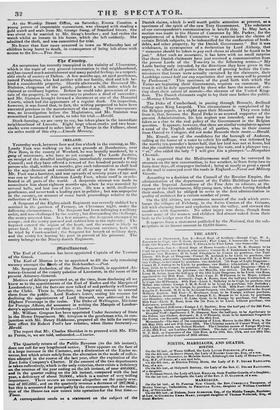The Quarterly return of the Public Revenue (to the .5th
instant), does not call for any lengthened notice. There appears on the face of it a large increase in the Customs, and a diminution of the Excise re- venue, but which arises solely from the alteration in the mode of collec- tion adopted in the course of the last year, after the expiration of the East India Company's Charter. If the amount of the two departments is taken collectively, which is the only criterion, there exists a deficiency on the revenue of the year ending on the .5th instant, of near 400,0001., and in the quarter ending on the .5th instant, compared with the last year, a deficiency of about 70,000/., which is a matter of very trifling importance. There occurs an increase altogether on the yearly reve- nue of 107,0311., and on the quarterly revenue a decrease of 297,964/. ; but this is accounted for principally by the circumstance that the reduc- tion of the House.tax now comes into operation for the first time.— Times.
A correspondent sends us a statement on the subject of the Danish claims, which is well worth public attention at present, as a specimen of the spirit of the new Tory Government. The substance of our correspondent's communication is briefly this. In May last, a motion was made in the House of Commons by Mr. Parker, for the appointment of a Select Committee "to examine into the claims of certain British subjects, to be indemnified for the confiscation of book- debts, and other property, by the Danish Government." But it was withdrawn, in consequence of a declaration by Lord Altborp, that " measures should be taken to pay such claims as should be found to be just." After such an assurance, it has been with no small surprise that these Danish claimants have just received a communication from the present Lords of the Tleasury in the following terms—" My Lords having only intended, by the directions they have given in the matter, to afford to all parties the means of proving before the Com- missioners that losses were actually sustained by the claimants, their Lordships cannot hold out any expectation that any money will be granted by Parliament." This specimen of the good faith with which the Tories are beginning their Government, requires no comment. We' trust it will be duly appreciated by those who have the means of cut- ting short their career of misrule—the electors of the United King- dom. The Danish claimants ought to lay their case before' the public. —Morning Chronicle.
The Duke of Cumberland, in passing through Brussels, declined calling upon King Leopold. This circumstance is complained of by the Belgian papers, as a slight upon their Monarch. They even infer from it, that, because the Royal Duke is an avowed supporter of the present Administration, his late neglect was intended, and may be taken as a clue to the real policy of the Government in the Belgian question. It appears, however, that there are similarcomplaints against s2veral of the English nobility, of all parties, who, in their course from Ostend to Cologne, did not make Brussels their route.—Herald.
Mr. Etwall, one of the candidates for the borough of Andover, calling at the house of a voter to solicit his suffrage, was informed byt the worthy ten-pounder's better half, that her lord was not at home, but that.the candidate might rely upon having his vote, and a plumper too; " or," also added the lady " I will give him a plumper."—Hampshire Chronicle.
It is supposed that the Mediterranean mail may be conveyed in steamers on the new construction, in fine weather, in from forty-two to forty-four days, all stoppages included ; being at nearly as great a speed as the mail is conveyed over the roads in England.—Naval and Military Gazette.
According to a decision of the Council of the Russian Empire, the administration of the: department of the Public Buildings has autho- rized the Imperial Accademy of the Fine Arts to educate, at the expense of the Government, fifty young men, who, after having finished' their studies, shall be obliged to serve in the first administration in quality of architect for a certain number of years.
On the ‘).:Id ultimo, ten enormous masses of the rock which over- hangs the villages of Felsberg, in the Swiss Canton of the Grisons, fell with alarming force and explosion into the valley, and strewed the meadows with fragments. No other injury was done, though from terror many of the women and children fled almost naked from their beds to the bridge over tIe Rhine.
It appears from a statement published by the National, that the sub- scriptions in its favour amount to 12,618 francs.


























 Previous page
Previous page